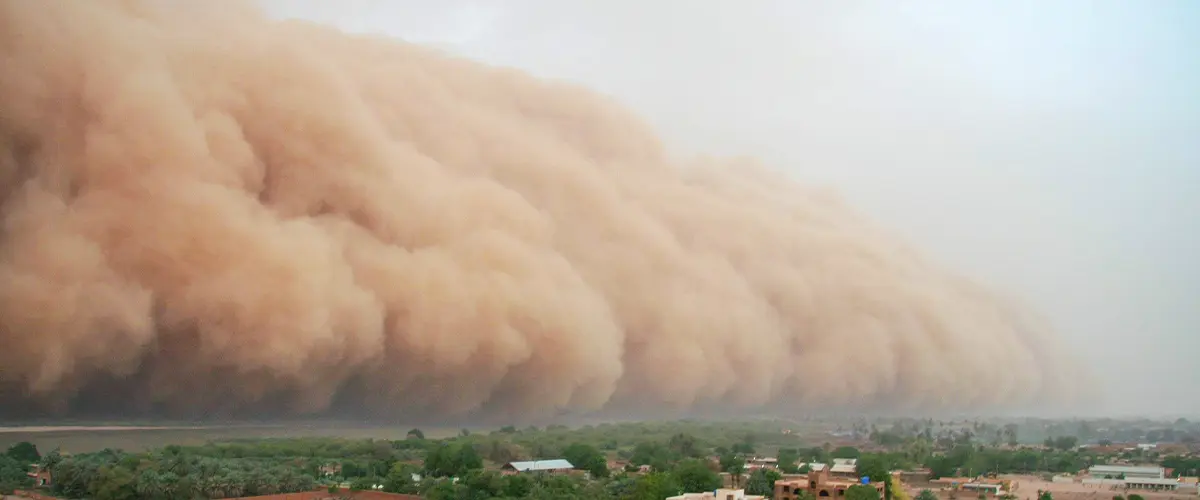Are you dealing with unexpected home maintenance issues after Arizona’s sand storms? It’s a fact that these dust storms can do significant harm to both the exterior and interior of your home, your property as a whole, and even your health.
In this article, we’ll uncover the 5 common problems caused by these tempests, providing feasible solutions for each one. Get ready to protect your house more effectively against the next sand storm!

- Sand storms in Arizona can break windows, hurt roofs, and chip house paint.
- A lot of dust gets into homes during these storms. This dust hurts the air quality inside the house. Dust can also harm electronics.
- The dry soils and weather in Arizona make it easy for sand storms to form.
- Breathing in dusty air is not healthy. It causes problems like coughing and chest tightness. Always stay indoors during a storm for safety reasons!
Sand Storm Damage to Home Exterior
In the wake of Arizona sand storms, exterior home damage is very common. The extreme force from these winds results in cracked or shattered windows. Roof structures are frequently harmed as well, reducing their functional lifespan considerably.
Additionally, chipped paint or siding due to flying dust and debris is another issue homeowners face, not forgetting UV damage that wreaks havoc by fading home sidings prematurely.
Cracked or broken windows
A dust storm can harm your windows as well. The wind carries small rocks and dust that hit with strong force. This may lead to cracks or even break the glass in the window. Even if the sand storm doesn’t break any window, it’ll definitely scratch it.
You should fix this as soon as you spot it. If not, the damage will get worse over time.

Damaged roofs
Sandstorms can be rough on roofs. They blow tiny grains of sand at high speeds. These fast bits of sand can hurt the roof over time. Some tiles or shingles may break because of this.
UV damage from the sun is also a big worry for your roof in Arizona. This damage gets worse as years pass by. Tiny cracks may start to show up in your roofing material, allowing water leaks when it rains.
Always check your roof after a sandstorm to see if it needs any fixes.

Chipped paint or siding
Sand storms can chip home paint and siding. The rough grains of sand strike the house during a storm. They peel off bits of your exterior paint or make splits in your siding. This leads to UV damage on home siding, giving it an old look too soon.
To keep your house looking fresh longer, watch out for this issue after each storm hits.

Indoor Air Quality Issues
Arizona sand storms can cause severe indoor air quality issues. Dust accumulation is a significant problem, leading to a dirty living environment and potential damage to electronic devices.
The dust stirred up by these storms can also trigger allergies and lead to respiratory difficulties, making it crucial for homeowners to take preventive measures.
Dust accumulation
Dust piles up during Arizona sand storms. It hides in all areas of your house. It settles on furniture, books, and toys. Dust can even clog your air systems, like the air conditioner or heater.
Too much dust in a home is bad news for devices like computers, too! This dust buildup can lead to trouble later on if not cleaned up right after a storm.
Allergies and respiratory problems
Sand storms bring lots of dust into your home. This dust can lead to allergies and breathing problems. Dust makes it hard for you to breathe. It also hurts your eyes and nose. If you have asthma or other lung issues, dust makes them worse.
You might cough a lot or feel tightness in your chest. The best way to fix this is to keep doors and windows shut during sand storms.
Damage to electronic devices
Sand storms can harm your computers, TVs, and other electronic items. Tiny grains of sand get inside these devices. The dust may cause scratches or make the parts wear out faster. You need to clean your devices after a sand storm.
Be sure to unplug them first for safety!
Health and Safety Concerns
Poor visibility
Sand storms in Arizona can make it hard for you to see. This is called “poor visibility“. It’s like trying to look through a thick fog. But instead of water vapor, there’s dust floating in the air that blocks your view.
The lack of clear sight makes it risky to walk or drive around your home. You may not spot a harmful object on the ground or see an approaching car on time due to poor visibility.
Increased risk of accidents
Sand storms can lead to accidents. The thick dust makes it hard to see your way around the house. You may trip on items or run into sharp corners.
Also, outside is very unsafe during a sand storm. It’s tough to drive when the air is full of sand. Even walking could become risky because you might slip on uneven ground.
Health hazards from dust inhalation
Dust inhalation is a big problem. Breathing in dust from a sandstorm can make you sick. This is not healthy for your body. If dust gets into your lungs, it can cause breathing difficulties.
People may cough more or feel tightness in their chest too. It’s very important to stay inside during a sandstorm to protect your health. If you must go outside, wear something over your nose and mouth, like a mask.
Most of all, keep the air in your house clean as much as possible using an air purifier to filter out dust particles.
Conclusion
Here at Offcut Interiors, we’re making sure our home remodels can stand the test of any type of weather, regardless if it’s a sandstorm or a thunderstorm. We’re using the best building techniques to ensure our work holds even against all odds.
